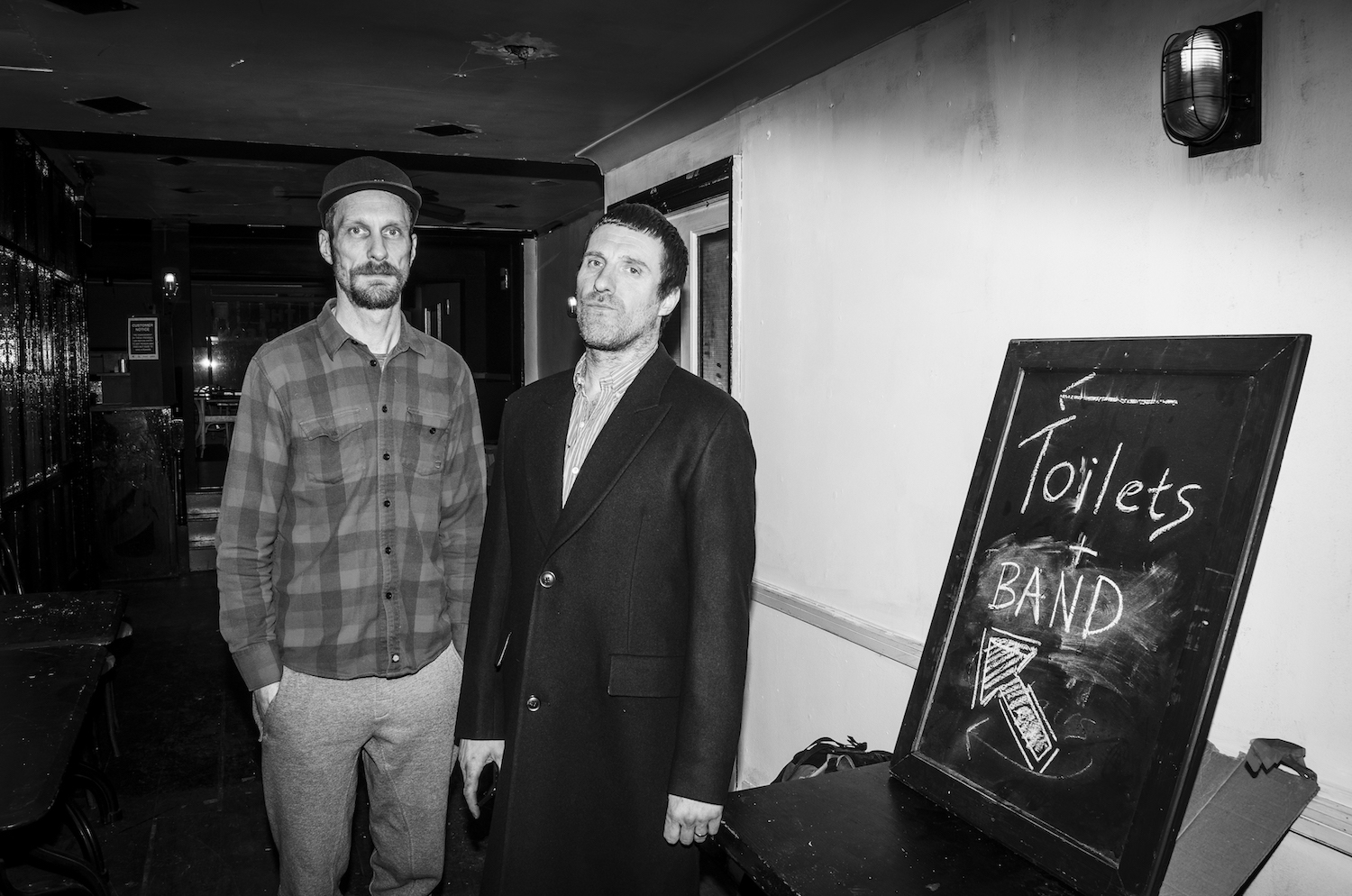Words ZACHARY LIPEZ Photography SIMON PARFREMENT
Sleaford Mods, a pop duo made up of Jason Williamson and Andrew Fearn, are either great or terrible, or possibly both, depending on where one stands on (The) beats, musicianship, and England’s perpetual, haughty, and entirely hopeless dreaming. Sleaford Mods are complicated like Brutalist architecture. Oppressively catchy like all great pop music. They are the monkey’s paw logical conclusion of Consolidated’s The Myth of Rock and, according to their worst fans, England’s greatest rock band. What makes them great is entirely through their own force of will (don’t worry they’re not Objectivists, just pissy). They decided to exist in a world that didn’t know needed them. They have songs as catchy as they are abrasive. They both have cheekbones appropriate for their vocation. What makes them, in context, occasionally terrible, is entirely not their fault: People want them to be the Sex Pistols. They are not The Sex Pistols. They are, like the song said about Sid, innocent.
I want to get my qualms out of the way early because I am a fan of the Nottingham (though the band claims no town’s scene really) beatbox and rant twosome. I’ll say what grates about them, with no blame cast upon them, and then we can get to the sweet quotes and adulation. If you’re like the fans interviewed in the recent documentary about the band, Bunch of Kunst, and you love them unfailingly and see them as the lone spokesmen of Working Class England, then you can safely skip ahead a few paragraphs. I’d begrudge you nothing. When the clampdown is everywhere, No Gods No Masters is a hard enough thing to put into day to day practice.
The Auteurs’ Luke Hains and Iggy Pop have both called Sleaford Mods the best band in the land, but producer Steve Albini put it best when he said, “Hands up who thinks Sleaford Mods are the best band in the world. The rest of you are wrong.” In reviews and on social media, their fans revel in the Mods as a return to “real music” and, gag, authenticity. They are the only current band with something to say. In echoes of Quietus-style lamentations at the dearth of “political” music, Sleaford Mods are positioned by many as the only game in town. Every time this hyperbole come down from high and up from low, I want to hand out mixtapes with, if not the last twenty years of punk and hip-hop and scabrous noise from London suburbs and Providence RI, than at least bands like Algiers on one side and Downtown Boys on the other. Older men, of indie and guitar partisan stripes, are deeply invested in Sleaford Mods being rock. They love Rock and they love Sleaford Mods so they make the numbers work.
Of course Sleaford Mods detractors are equally simplistic with “cruise ship Fall” and “this just sounds like The Streets” and “this isn’t music” thrown around like being lazy was a virtue. Fuck those people too. There are surface similarities and singer Williamson makes no secret of his affection for Original Pirate Material (though Wu-Tang is more often cited in the Mods’ creation story). The Fall comparisons work only because there aren’t that many singers ranting with a thick English accent, but Williamson shares few of Mark E. Smith’s obscurantic obsessions. And he enunciated like a motherfucker. Williamson’s equally frustrated with the uses of power and those on the receiving end as Smith but, unlike The Fall’s hip priest, for all the references to specifically English places and persons, you, even when you may not know what Williamson is talking about, you know exactly what he’s talking about.
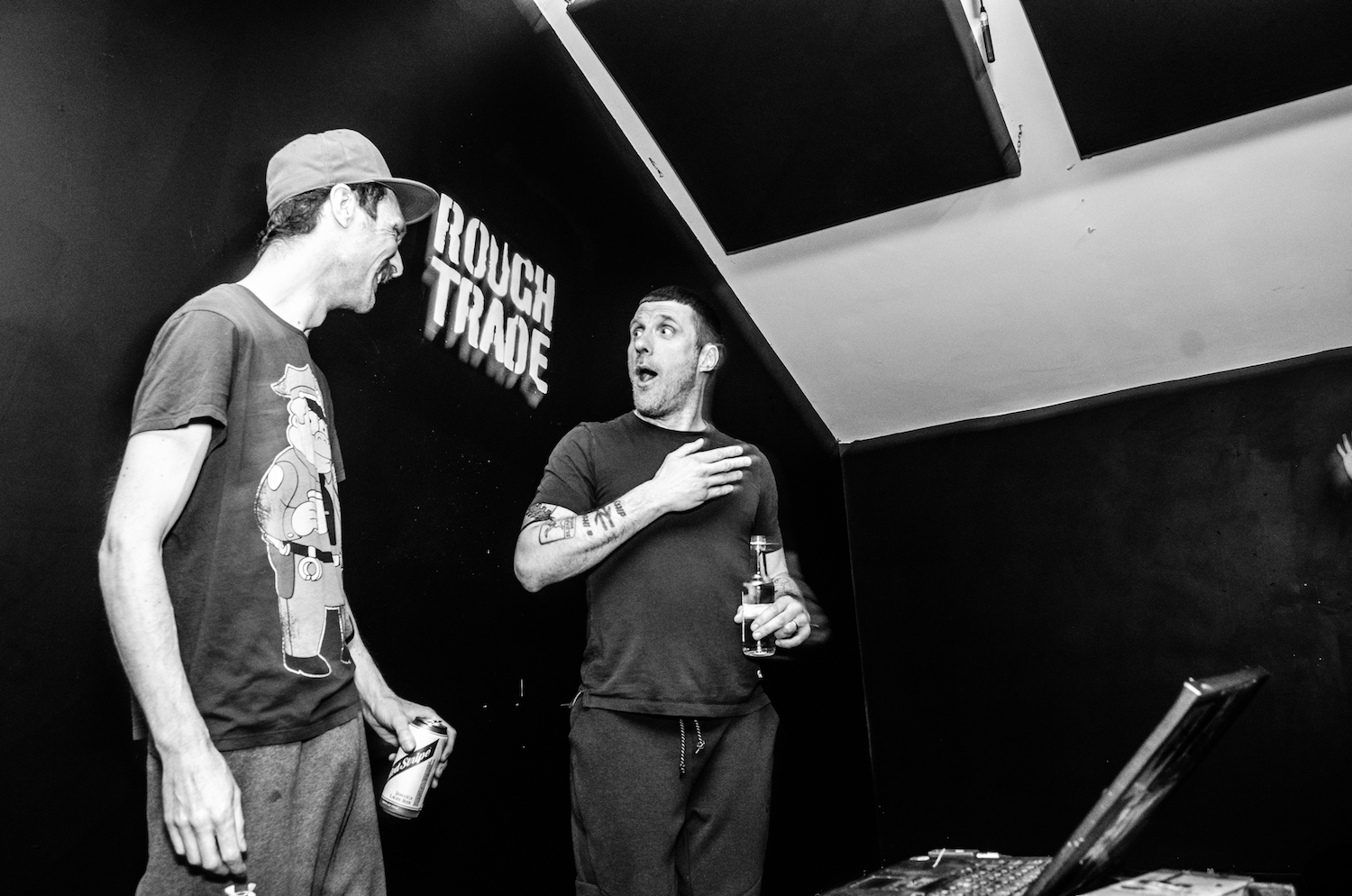
Sleaford Mods may not be The Sex Pistols, thank god, or The Fall, or Oasis or Sham 69 or any other great white hope or shame. If they’re Arthurian saviors, they’re of the John Boorman sort, weird and sweaty, bound to die in the muck. They may not take it as a compliment but Sleaford Mods are closer, in framing a lived reality that most fail to articulate and slathering it in unshakable pop music, The Pet Shop Boys. Maybe an Oi! Pet Shop Boys but I’ll set that notion aside as I’m trying to not get too excited.
Like punks and folkies of yore who decided their own fates, Sleaford Mods didn’t grow up in musical families. Williamson told me, “My parents weren’t very musical. They bought pop records. Contemporary stuff like Human League. All the stuff that was in the charts—Yazoo, Adam and the Ants. I suppose they’re all cool but I was into the Pistols at the age of 10 or 11.”
Fearns said that his parents had “a few things, Johnny Cash and Elvis. But I would buy records that were advertised in tele. Compilations, when I was like seven. I didn’t know who any of these people were. There’s one called monster tracks that I remember that had a footprint in the snow on the cover and it had like a Who track and a Rainbow track.”
Williamson chimed in, “Yeah, I remember that one.” Fearns summed up both the desert and the happy result of the desert with, “I think I had a Barry Manilow album. I think it’s great to be in a crap musical place like that when you’re that age. You know what I mean? Because you do learn how to find things on a record.”
What I assumed were formative bands to Sleaford Mods were not. While talking, Williamson had to strain to remember Sonic Youth’s name, using them as an example of a band apart while qualifying that he wasn’t even that into them, and when I tried to press a Big Black comparison upon the Mods, Williamson kindly but firmly said, “I haven’t even heard much of Big Black; you’re a Big Black fan aren’t you, Andrew?” and Fearns agreed but with his own qualifier then pivot saying, “Yeah… used to listen to a lot of stuff you know. I find it weird how people hear music and what happens in their brain. I remember DJing; this girl I used to live with had all these King Tubby records and all this ska stuff and I was just putting them all on 45 and King Tubby speeded up so it sounded more like drum and bass. I realized punk music is the same tempo as drum and bass… on a musical level, not with labels of describing, just purely the music, I don’t think I really see any boundaries. I like music. I don’t care if it’s a silly pop tune or classical.” The only band that Sleaford Mods regularly sites as an influence is the contemporary power electronics act, Consumer Electronics.
As mentioned, the band got started in Nottingham. Jason, after years adrift in the UK indie scene and sick to death of guitar rock, formed the Mods with Simon Parfrement. The basic template was there, though more likely to use loops of Northern Soul samples than the harder austerity that came when Fearns replaced Parfrement (amicably and with Simon still remaining a part of the larger team) in 2012.
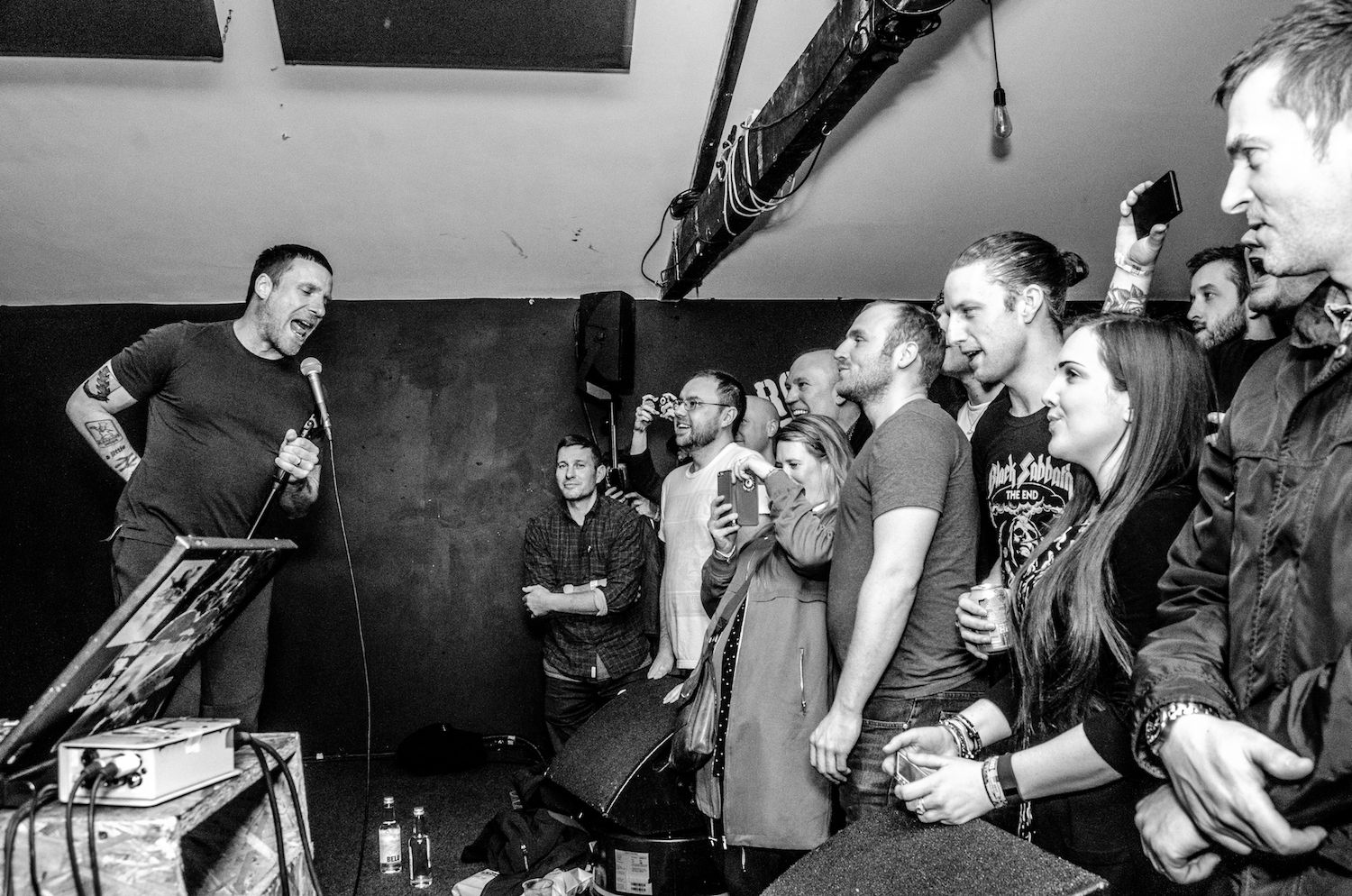
The two men in Sleaford Mods are clearly extremely fond of each other and aren’t worried about discussing their partnership in historical minded terms that harkens back to NME indie darlings from the ‘80s, though with a level of self-aware humor that comes with not being utter dicks. Early in our interview, when talking about where Sleaford Mods will belong, Williamson says, “I’d like to think we’ll be remembered, and be a good page in the history of good music, music that not so much changed stuff but stood out.” And later he says, “We’ve forged a good strong partnership. Fearn and Williamson. They’re strong names as well. When me met I said, ‘what’s your second name?’ and he said ‘Fearn’ and I said that’s fucking brilliant. You should call yourself ‘Andrew Fearn.’ He said ‘you reckon?’ and I said ‘yeah.’”
The band toured relentlessly over the UK and Europe, building a grassroots fan base that those who’d dismiss them as a hype band have to choose to ignore. By 2013’s Austerity Dogs, I was hearing about them from the likes of Chavez’s Matt Sweeney, an early stateside convert. Their first US show, in 2014, at the unlamented Bushwick venue, The Wick, was a sold-out, tense affair. Williamson, still drinking at that point, was a jerking spittle device, his patented Brad-Pitt-In-12 Monkeys head throb and tics in full display. Beer was hurled at the Mods and analog synth wizard, fan of the band, and former Scottish tough, Drew McDowall, took the assailant out in a headlock. The dude bit McDowall’s hand as lesser indie types took the opportunity to work things out by taking pot shots at the punter’s skull. It was a bracing, angry, not unfun show. I was supposed to interview the band afterwards but chickened out as Williamson seemed more wire than man.
In contrast, this year, with the Mods riding a wave of praise and Williamson a sober man with two kids, one, at 5-years old—old enough to “sing you the album, well she can sing all the choruses anyway”—the Sleaford Mods were jovial and approachable. Even with the Warsaw show’s audience being a who’s-who of aging angry young men, a crowd that might have been an NA meeting if any of the attendees had the sense to quit, the show was a rowdy blast. Even the most pointed lyrics took on the quality of a boozed up sing-along at the wake of an uncle we really loved. It was, for lack of a better word, extremely jolly.
For a band that a definite aesthetic that thrives in its constraints, Sleaford Mods’ new album, English Tapashttps://store.roughtraderecords.com/products/sleaford-mods-english-tapas, their first on Rough Trade (“We took it as far as we could with the infrastructure we had…” They humor me when I make a Moldy Peaches joke.), is a leap forward. I was grateful to not be laughed out of the room when I called English Tapas their “New Model Army album”, with Williamson admitting they’d been making the same comparison just days earlier. Andrew Fearns, often unfairly discounted as the primitivist wallpaper to Williamson’s breaking the living room furniture, gives the song a previously understated melodicism that Williamson, armed with newfound inclinations towards self-analysis and a bit of voice training, steps gamely into. Fearns still writes bass lines at home, even using old files “lying around the house” from an old band he was in that “didn’t go anywhere” and live he still just rocks behind his computer, pint in hand.
But English Tapas feels like an album where the actual partnership of the band is shined upon. The duo is unduly afraid of appearing pretentious or overtly intellectual in their approach, referencing Madness of “Baggy Trousers” fame more than any obscure synth works, but, on “Time Sands,” that doesn’t stop Fearns from including musique concrète touches like found sounds of crickets that serve both rhythm and atmosphere. (Even the sound of anonymous band playing the French festival where the cricket sounds were captured is included.
Fearns, with irritating self-depreciation, says, “Yeah I’m always twatting about. That was actually at festival we were at, the cricket sounds. Because in the end a weird sound comes in that was actually a band that was there playing. Because I was backstage and I could hear this cricket and it was under those metal things that people walk on so I put my phone in there and recorded it.”) Throughout the record, while maintaining the usual Mods method Fearns describes as, “less is more. Take a simple loop, speed it up, EQ it so it sounds good and there you go. I think people try too hard and there’s too much turd polishing,” the duo still manage to blur their previous borders, allowing a welcome (sad) warmth and peace-punk chaos inside.
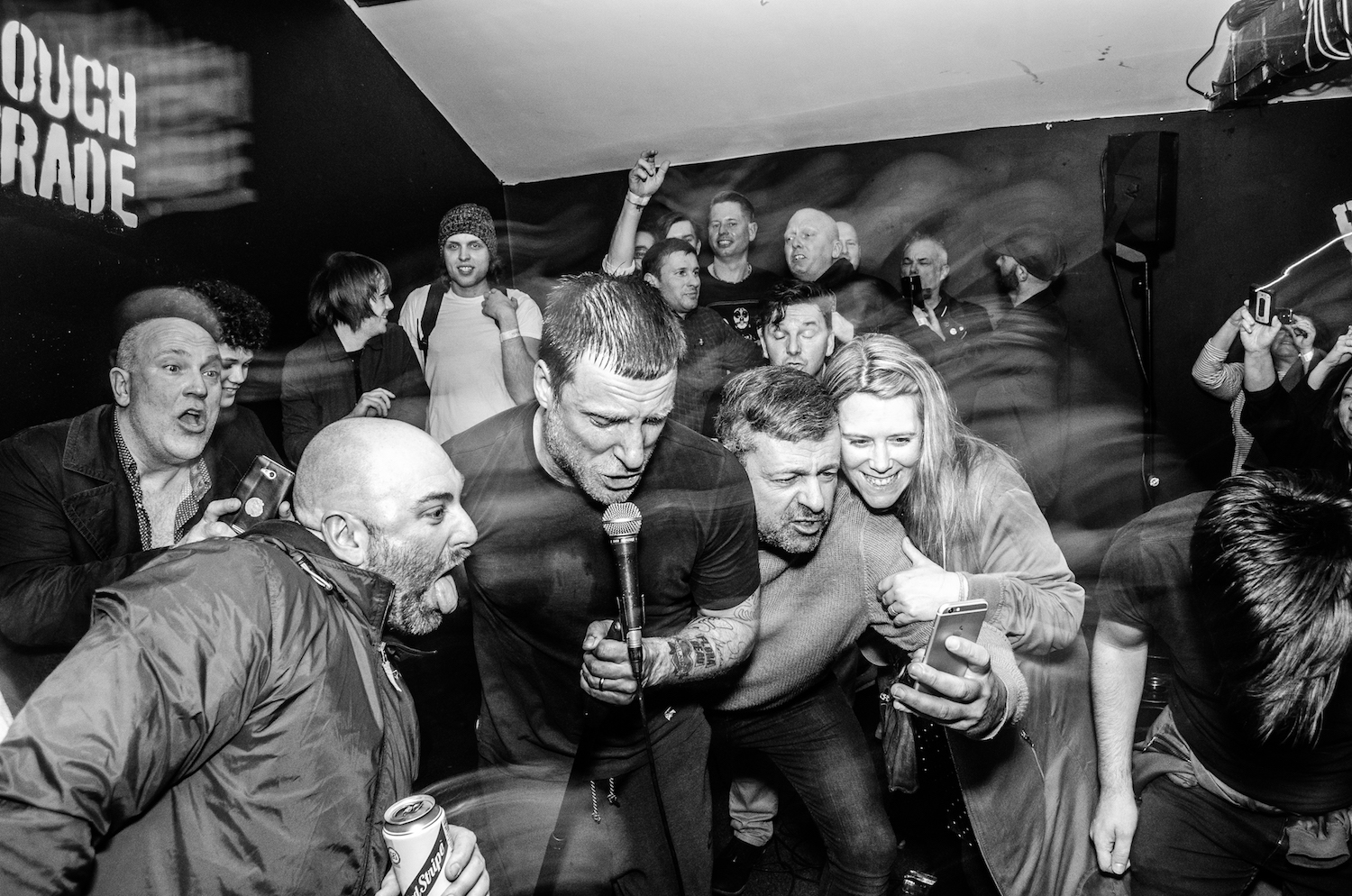
When the band first started, the goal was singular and, as Williamson says, “Influenced by collective voices of Wu-Tang. Voices going in and out. I was obsessed with the idea that I could do something close to that. Not so much the rapping, but the tone and the delivery. So I didn’t really fucking care what Andrew was doing as long as I was doing that.”
Meanwhile, the new material is the product of the two men striving (even if they won’t admit to an excess of effort… the number of times they refer to Sleaford Mods as variations of a “massive accident, but not” is… high) for a cohesive “darker and broader” collaboration that “because they’re more songs on it, not so steeped in in-jokes and lingo,” speaks outside of any previous modes. Williamson says, “This album, we managed to accomplish ideas in it that two years ago we would have gone “fuck off! I ain’t singing that. It’s shit! I just want to go ‘blargagaggagagagg!’ Things change.”
Williamson attempts to sum up with, “Andrew created his own style that worked with what we do. He does what he wants and just brings it. We know what each other wants. So much, as with any great band, is accidental and circumstantial. A massive amount of luck and fate, you know what I mean?” and, on cue, Fearns both undercuts any notions of grandiosity while making the case for why the Mods stand-alone (but don’t have to), “Other bands, they gotta get the right guitar for a certain sound. And that’s fine. But everyone has that sound. It’s just money. It’s pointless. So if you do get a really crap drum beat and play a bassline over it, in the modern world you’ll have something original. Because you can’t buy that. Anyone can do that for themselves. We all got a pair of ears.”
It’s tempting to attach narrative to every album cycle and god and every social media expert knows people will more readily click on sordid revelation and exposure of guts than they will on “these songs are good.” So we can be forgiven if we’re inclined to sell a Sleaford Mods of Newfound Maturity. And people, if not gripping their mohawks with both hands, will eventually express their concerns. But Sleaford Mods have hardly become navel gazers. While English Tapas abounds with character sketches and internal reflection both, they know they are citizens of a former empire that nonsensically allies itself with another empire in decline.
When I tell them that my Afghan partner admires that they sidestep the weird English pride that sometimes plagues even progressive malcontents like Blur and The Jam, Williamson says, “We’re not proud of our heritage. We’re not nationalists. We’re not into the idea…. We’ve looked into things, analyzed things; we’re quite aware of the fact that we’re a shitty country in the grand scheme of things. We don’t have a good history.”
Unprompted he adds, “We stay away from misogyny, which a lot of bands do without realizing it. We stay away from that. (The music is) just brutal, hard, cold, walking down the street. Mixed with hard, cold self-criticisms.” (He also adds, correctly, “and quite fun.”)
Our discussion of the outside world lead back to the reoccurring shadow text of all white angry UK music of the last forty odd years: the Sex Pistols. John Lydon had just been in the news for expressing an inane tolerance for Donald Trump that bordered on admiration. A sort of “we crazy lads recognize our own” that, considering Lydon’s public track record, shouldn’t have been such a bummer, but was. There are a few vocal lines on English Tapas that echo Lydon at his best so it seemed reasonable to discuss, or maybe I was just looking to stir the pot.
Williamson says, “I was quite influenced by the Pistols when I was a kidjust quite taken by them. But that went soon vanished and I forgot about it. It wasn’t until I started dabbling with Sleaford that I kind of reintroduced that part of myself…. I’m not massively a fan of P.I.L. I started listening to Metal Box a couple of years ago and then stopped once I got the gist of it. His vocals in general changed when he joined P.I.L., but when he had his early voice—that raspy high-pitched beautiful voice…. I think we were saying earlier, weren’t we, it’s just your mom and dad, innit? John Lydon is my mom and dad. Same age. Our parents are similar in that white, UKIP… you know, won’t have it. He kind of reminds me of them—how he talks. It’s almost like he can’t be arsed to carry on or to learn.”
Williamson was a bit more forgiving of a similar Kate Bush gaffe (where she expressed some admiration for Prime Minister May), saying, “It said more about… it wasn’t as if she supported it; she just seemed sort of distant divorced from it. You find quite a lot of these people who have been in music all their lives and not really ever worked that have unrealistic or absolutely no idea at all, you know what I mean?”
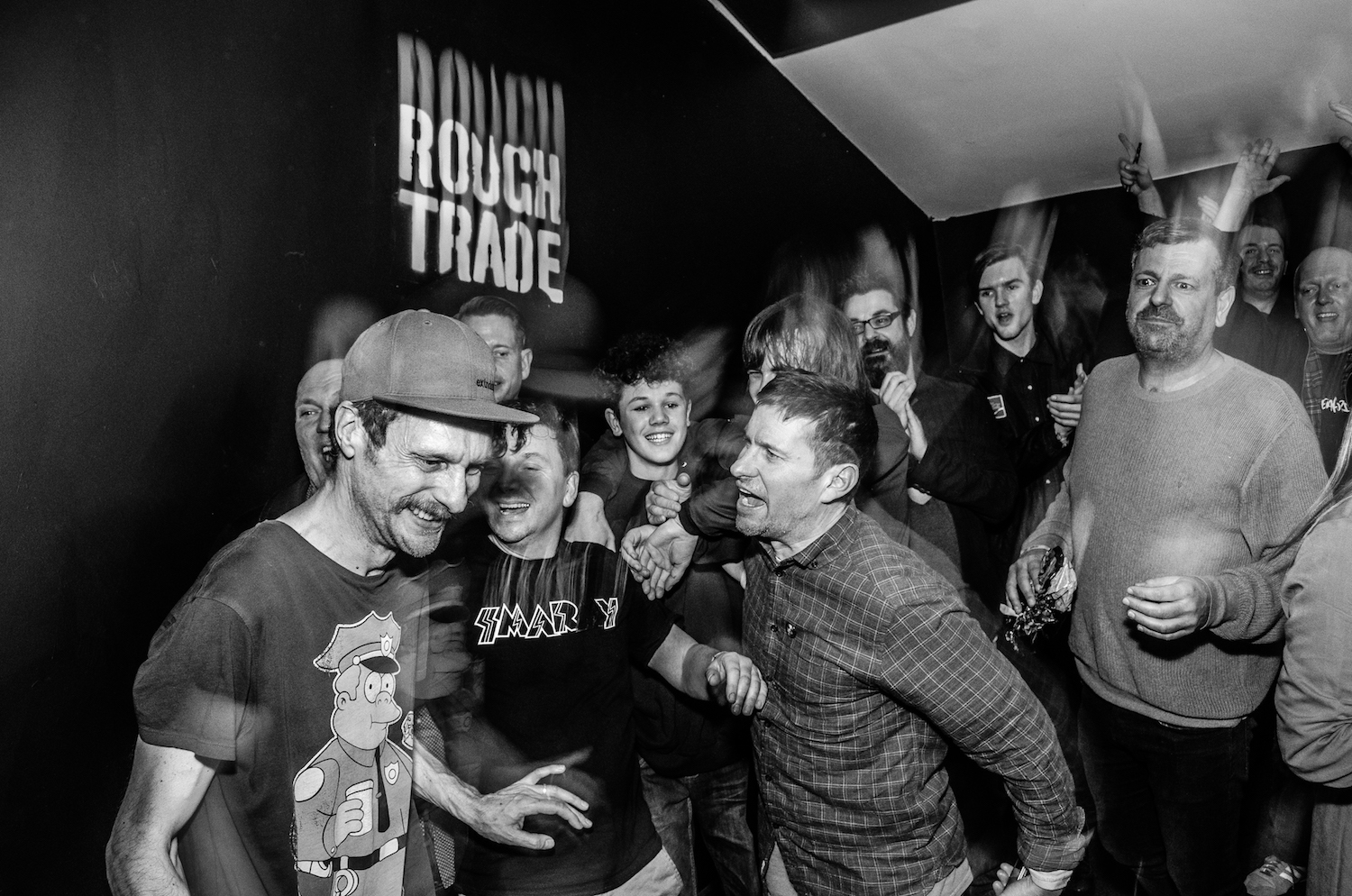
I ask him if he felt like that’s something one has to actively strive against, now that Sleaford Mods are operating in the rarefied air of surviving on music alone, or whether such attitudes were hopelessly ingrained, and Williamson replied, “You have to be conscious of it…. Nothing is ingrained. Anyone can turn into a wanker at any point.”
Are Sleaford Mods the last brave gasps standing, world weary stalwarts raging against a corrupt world, or are they hyped-up white boys, tunelessly flailing for the attention of post-punk diehards in too-tight band T-shirts? More the former than the latter I’d argue, despite any misgivings I may have about rockist strawmen in our midst.
Are Sleaford Mods the best band in the world? They’re one of them for sure. “Best Band in the World, Over Thirty White Cis Male Division” is not faint praise. It’s a crowded field. The men themselves are unconcerned. They want to be a good band and they are. They want to matter and, to more people than most bands get, they do.
Will history remember them? Well, history has been wildly kind to some real crap music so who knows and who should care? For himself, Williamson, has been enjoying the eternal, also divisive, authentic by his own standards and unconcerned with anyone else’s, Elton John, saying “It’s all I’ve been listening to. Yellow Brick Road. Fuck man, that’s such an album. ‘Candle in the Wind’. ‘Benny and the Jets’. It’s real. It’s fucking real.”
